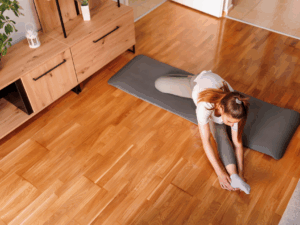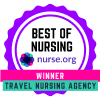Travel Nurses Share What It's Like Working Med-Surg, PCU & COVID-19 Units

While the COVID-19 travel nurse jobs and media buzz surrounding the pandemic focus on ICU, nursing is a collaborative practice. Even during the best of times, nurses working Med-Surg and Progressive Care need to be top-notch multitaskers and proactive critical thinkers. They react quickly as patient conditions may change at a moment’s notice. Whether you’re a new grad nurse or have years of experience, working a COVID unit brings a new set of challenges. And we’re breaking them down with insight into what it’s like working during the pandemic on COVID-19 units across the country.
- Nursing During COVID-19: 3 nurses share their experiences caring for patients during the pandemic, from COVID-positive units to Med-Surg.
- Travel Nursing During a Pandemic: Our nurses explain that travel nursing right now means working hard, and resting harder.
- Advice for Travel Nurses Working During COVID: Learn why our nurses stress the importance of taking care of yourself.

Part 1: Nursing During COVID-19
RNs who work Med Surg care for adult patients who are acutely ill with a variety of medical conditions and diseases, or can be recovering from surgery. This variety requires Med Surg nurses to be master coordinators, multitaskers, and level-headed. Oh, and skilled in just about everything. PCU nurses monitor critically ill patients utilizing different devices and technology to monitor patients, analyze data, and react with confidence. To work in the PCU, you’ll need to be a critical thinker who can make rapid decisions.
Now add a novel disease we know little about into the mix. It quickly becomes a balancing act: the learning curve that comes with vents, drips, and COVID-19 protocol, varying patient acuity levels, and advocating for patients while under emotional stress that accompanies caring for patients who are still without their families. But they also get to see patients go from near-death to healthy enough to go home — and that’s a cause for celebration.
What is it like critical care nursing in COVID-19 units all over the country? We asked TNAA nurses to tell us about their experiences.

Meet Ethan, RN BSN — a travel nurse working in New York City on a step-down COVID unit
“Around mid-February, I had my next contract lined up — I was going to Kentucky. But during my last shift, I found out about my cancellation. Nichole, my recruiter, immediately found me another assignment, this time in Florida. After completing modules and lining up a spot for my RV, I got word of another cancellation. Luckily, the campground was understanding, and I got my deposit back. That’s when Nichole found an assignment for me in New York City.
Right now, I work on a step-down unit taking COVID patients. As a traveler, I’m usually the first to float, but being flexible is part of, or in my opinion, should be a part of being a travel nurse. Most often, I’ll float to Tele, but on occasion, I’ll get floated to ICU to take PCU transfers waiting on beds to free up an ICU nurse — which is my favorite place to float and is a great place to learn solid critical care skills. And that’s helpful because the status of these patients can change quickly. I came in during a transition period. The goal is to free up the makeshift ICUs — which stressed the current model — to step down to re-open ORs and PACUs. At first, we only had 1 RT on our floor, who was also floating to several other floors.
I didn’t have a lot of vent experience, and fortunately, the hospital had a lot of training sessions on the different ventilators. And most of the patients on my unit are long-term vents, so they’re easier to maneuver. Intubating is pretty normal for step-downs, particularly on this unit; they were intubating 7-9 patients a day prior, so they were used to sick patients.“
Meet Trish, RN BSN — a travel nurse working in South Carolina on a Med-Surg unit

“I am a Med-Surg and Tele nurse. When COVID started, I was already on assignment. I was slightly concerned that the contract would be canceled for a low census, as the hospital cleared out all elective procedures. I knew that if I had a contract cancellation, my only option would likely be to take a COVID assignment. For me, it’s about the same as working as a travel nurse at any other time. I’m lucky enough to be in a stable contract, and I haven’t had to work with COVID patients much. Even though COVID is here and we are directing most of our resources to care for those patients, we still have to care for the sick people who have problems other than COVID. Since I work in Med-Surg, I’m primarily responsible for taking care of non-COVID sick people. When COVID first started to impact the community I work in, the hospital canceled all elective procedures and focused on preparing for the outbreak. Several units were closed or taking very few patients. As the crisis has continued, patients with chronic illnesses began to need immediate medical attention due to the lack of available resources for their regular maintenance care. I’ve been able to provide care to those patients while our COVID units have focused on those affected by the pandemic.“
Meet Kristyn, RN BSN — a travel nurse who just finished an assignment in New Jersey
“My assignment began on April 11th. New Jersey is my home state; I grew up here. When Governor Murphy put out the plea for healthcare relief workers, I felt it was important for those who are capable of answering that call. And I am capable, so I did. Med Surg Urology and Diabetes Management are my specialties, and I’m trained in Pelvic Floor Rehabilitation. But I’m capable, so I answered the call.“
Part 2: What is it Like Working as a Travel Nurse During a Pandemic?
Our travelers have worked in units all over the country, walking into a new facility every 13 weeks. Before this pandemic, some travel nurses felt that they had to prove themselves to receive tough cases. You can expect that taking a contract now will test your skills and require endurance. Despite a traveler’s experience working in new places, walking into a new unit during the COVID-19 outbreak is inherently different.
Ethan, RN BSN
“Flexibility is always important in travel nursing. After my second cancellation, I told my recruiter, ‘I don’t care where I go, as long as I have a 4/20 start date.’ That’s how I ended up in Manhattan.
During orientation, they asked if I was ready to take patients the next day. I’m pretty comfortable with the acuity, but there are always differences in new facilities. I asked if I could take a full patient load the next day, but with someone — like a mentor — with me to ask questions, help locate things, and make sure I was charting correctly.
I told them I was flexible with scheduling, so now I’m working 4 days in a row. They built my schedule around their needs. It’s kind of nice because it doesn’t leave a lot of days off. Nothing is open, really, so it works. You can walk the streets, but I don’t want to do that. I’d much rather be at home. For starters, I don’t have to wear a mask at home! Since I’m working with COVID patients, I want to protect others by limiting my time outside. Luckily, where I’m staying has a rooftop, so if the weather is nice, I go there to decompress.“

Kristyn, RN BSN
“Considering this was my first assignment, I don’t have a comparison to make [to pre-coronavirus travel nursing]. I will say that while I came into this with a battle mentality, what I experienced was far more difficult than anticipated.
The staff at my assignment facility had lost many patients already. They were working short, and often sick themselves. They were grateful to have the help, but also didn’t have much time to orient us; we were essentially sent straight up to the floor.
We lost many more patients in the weeks that followed. The patient load was extraordinary. The bonds we forged between healthcare travelers working as a team, well, that’s what carried me through.
My mindset was that of a missionary; I didn’t come here for glory or money. I came here to work and to help New Jersey recover. And I accomplished my mission. I’m so grateful for the rewards of friendship and compassion that have grown out of this experience.“
Part 3: Advice for Travel Nurses Working During COVID-19
From busy COVID units to quiet Med-Surg floors, travel nursing offers a little bit of everything. Our nurses in less populated areas — looking at you northern Maine and Idaho — haven’t seen the overwhelm that can accompany this pandemic. The coronavirus met PACU and OR nurses with cancellations.
Meanwhile, in other areas, the pandemic brought pandemonium to nurses working in critical care. Wherever you are now in your travel nurse journey — just starting or waiting to return — your fellow nurses are with you. Maybe you’ve been sidestepped by this virus. Perhaps you stood up to fight it in the ICU. Or found yourself caring for the patients who still require treatment for their chronic illnesses — yes, chronic diseases didn’t go away. Know that you’re not alone.
Ethan, RN BSN
“Ask questions! Since everything changes so quickly, perm staff are still figuring it out too. Being honest and upfront with your skills will go a long way. Most of the time, you can figure out charting if you play with it, but with so many patients, don’t hesitate to ask questions. The biggest thing is, just be willing to help and remain flexible.
When I’m not working, I avoid the news since I hear about COVID all the time. I need downtime. I need to decompress, so I’ll Videochat with friends or go up to the rooftop. You need that time to rest.“

Trish, RN BSN
“My downtime routines haven’t changed much. I try to find time to read a book or do some sort of physical activity. I have been keeping up with the various treatments discussed in the media. I think that the best thing the other specialties can do is take care of the non-COVID sick people. They need us just as much as the COVID-19 positive patients need us. Other patients don’t stop getting sick just because a global pandemic shows up.
I think the best advice I could provide is to be patient. The policies and procedures for COVID change daily, and it is hard to keep up with everything as it turns. I also would suggest remembering to engage in self-care; this is a stressful time, and burnout comes quickly, especially when you’re spending 12-hour shifts in an N95.“
Kristyn, RN BSN
“You are ready if you’re prepared to work hard under sometimes difficult circumstances. You have to love being a nurse to be a good nurse right now; this is not the time to travel if you are tired, burnt out, or fearful of COVID-19. Eyes open, chin up, whole heart to give.
I just got home from my New Jersey assignment working on a COVID-positive unit, for now, I’m resting.“
Nurse Support & the TNAA Difference
At TNAA, support is at the heart of what we do. We’ve always provided benefits that genuinely matter, from clinical resources to total well-being and mental health services. And that’s never changing.
Read More: This blog explores the mental health struggles of frontline workers & what resources we’re providing our nurses, from clinical support to total well-being.







